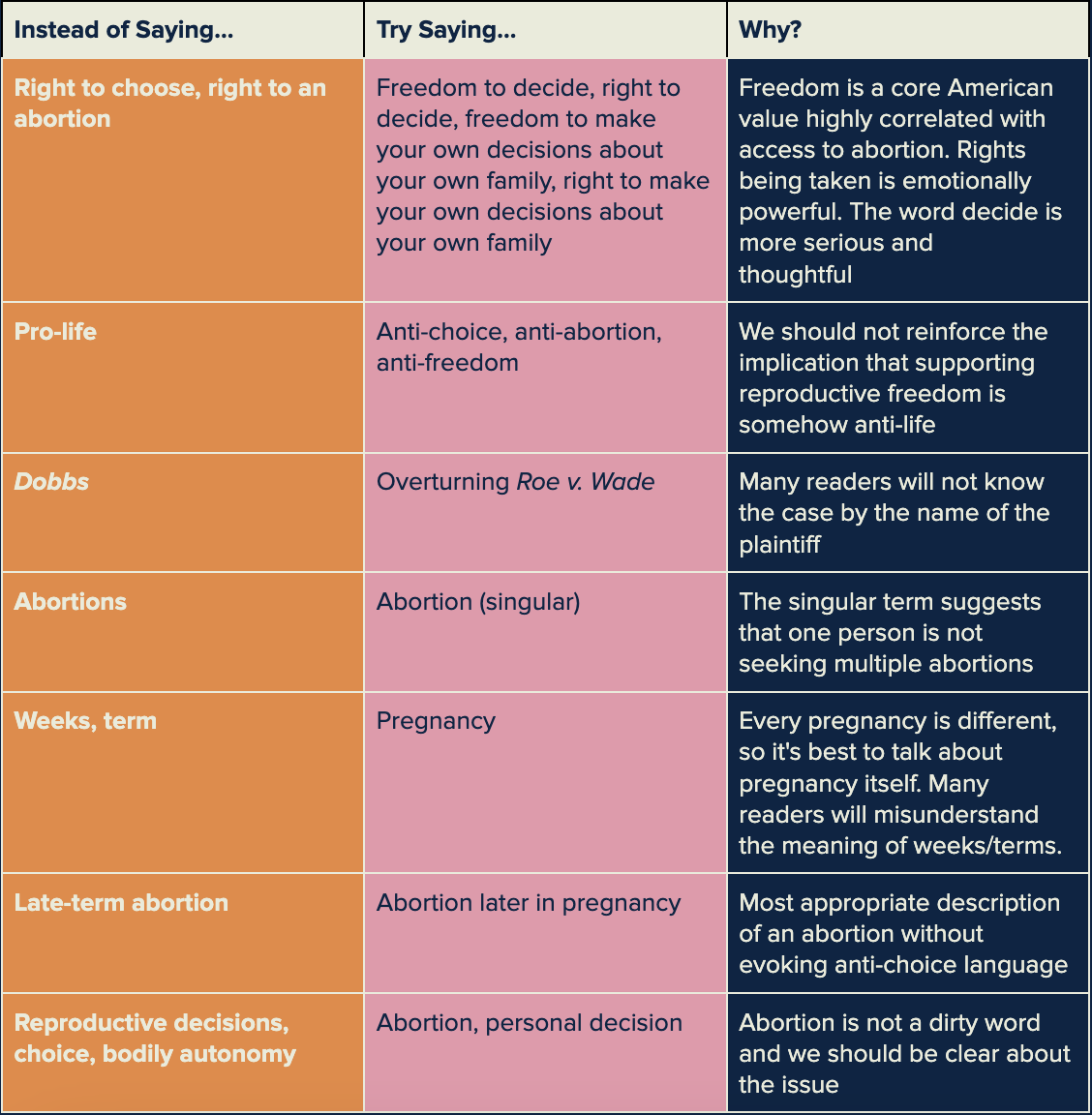Anniversary of Roe Overturned - Video Concept
June 24th, 2024 marks the second anniversary of the devastating Supreme Court decision that overturned Roe v. Wade and stripped the right to legal abortion that had existed for nearly 50 years.
Since June 2022, at least 22 million people across the country have lost access to abortion care and have been stripped of the right to make personal, private decisions about their lives. And anti-abortion extremists are only escalating their efforts. This June, the Supreme Court will issue decisions in two cases: one that will impact access to medication abortion and another that could repeal a law that requires hospitals to provide life-saving emergency care, including abortion care. If the Supreme Court sides with anti-abortion extremists in these cases, the decisions could have devastating impacts on abortion access across the country.
Free & Just is looking to create a compilation video highlighting your stories and what the anniversary of the overturning of Roe and the reversal of our rights has meant to you. We are asking you to record a short (1 minute) video reflecting on the loss of Roe in 2022 and how the reversal of our rights has impacted you in the two years since the decision.
Once you send in your video to us, we would love for you to share your video on your personal social channels as well in the days leading up to the anniversary of the fall of Roe, (June 17- 24th), if you are comfortable. Please tag Free & Just when sharing your videos so we can amplify them!
Video Content
Your video should be up to 1 minute in length and consist of the following parts. The majority of your video (30-45 seconds) should focus on your story & what the fall of Roe has meant for you.
Introduce yourself.
I’m [NAME] and I live in [CITY, STATE]. (can be after you hook with one of the phrases in section #2 below!)
I’m a [Mom/Veteran/Doctor/Faith Leader/Abortion Storyteller/Sister/Student, etc]
Introduce the Dobbs anniversary. Set the stage of why we’re marking the anniversary. You can say one of these phrases or use your own words!
“Two years ago we lost the freedom to decide when the Supreme Court overturned Roe. Since then, we’ve seen our worst fears come to life - abortion bans and attacks on reproductive freedom popping up all over just like we knew they would.”
“It’s been two years since the Supreme Court overturned Roe, and since then we’ve watched our fears come to life as anti-abortion conservative extremists work to pass abortion bans and restrict reproductive freedom all over the country.”
“Two years ago the Supreme Court stripped us of the fundamental freedom to decide and overturned Roe after 50 years. Since then, we’ve seen abortion bans, attacks on IVF, and more from anti-abortion extremists across the country.“
Sharing your story and what you’ve experienced since the loss of Roe. (30-45 seconds)
Tell us why the fight for abortion access is personal to you and what the fall of Roe has meant to you.
Questions to consider:
How did you feel having your rights stripped away in June 2022?
How did you feel when the news was first announced?
How have you felt the impact of attacks on our reproductive freedom since?
Call to action. Ask others to join you in speaking out. You could say one or two of these:
“Join me in sharing how you felt being stripped of our rights two years ago and how overturning of Roe has impacted you since.”
“Share your story so that anti-abortion politicians know” …
That the fight for our rights didn’t end with Roe
That overturning Roe has had tragic impacts
That we won’t back down when it comes to fighting for our rights.
That their abortion restrictions are unpopular, dangerous, and hurt real people.
That they have no place in personal, private decisions
“Join me in sharing what the fall of Roe and the rollback of our freedoms means to you.”
Format:
Please hold or set up your phone vertically, like you’re FaceTiming with a friend.
Tips for filming:
Please introduce yourself and include the city and state you live in.
Please shoot the video in a vertical orientation.
Make sure you’re in a quiet space, with no discernible background noise.
Select a background that isn’t too busy or distracting.
Make sure you are facing a window or light so that we can see you (try to avoid lamps or lights behind you!)
As tempting as it is to prepare a script, try to do the video without reading. We recommend practicing what you’re going to say a few times before recording!
Take your time, try not to talk too quickly. Pause slightly between phrases.
Be sure to be looking right into the camera when you speak. We’d like it to appear that you’re looking directly at the viewer.
Please consider your self-care as you decide whether and how to share your story.
Background on the fall of Roe:
We’re providing this information as background as you’re considering what you want to say in your video. This is not meant to be a script or talking points for your video. You are the expert on your experiences, and your stories are powerful in your own words!
Since Dobbs, twenty-one states ban abortion or restrict the procedure earlier in pregnancy than the standard set by Roe v. Wade.
Within the first 100 days following the Dobbs decision, 66 clinics across 15 states were forced to stop providing abortions. Among the 66 clinics where abortion is no longer available, 40 are still offering services other than abortion, while 26 have shut down entirely.
61% of Americans disagree with the Supreme Court’s decision to overturn Roe v. Wade.
As of today, twenty one states ban abortion or restrict the procedure earlier in pregnancy than the standard set by Roe v. Wade:
Abortion is currently banned in 14 states: Alabama, Arkansas, Idaho, Indiana, Kentucky, Louisiana, Mississippi, Missouri, North Dakota, Oklahoma, South Dakota, Tennessee, Texas, and West Virginia.
Florida, Georgia, and South Carolina ban abortion at six weeks of gestation.
Nebraska and North Carolina ban abortion at 12 weeks of gestation.
Abortion after 15-20 weeks of pregnancy is banned in Arizona and Utah.
Access to the abortion medication, mifepristone, has been increasingly under attack since the Dobbs decision. In March 2024, the Supreme Court heard a critical case that will have widespread implications for the availability of medication abortion. Nearly 150 House Republicans joined a brief urging the court to restrict access to mifepristone. If the Supreme Court sides with the anti-abortion advocates, it could result in a nationwide ban on mifepristone, leaving millions without a safe and legitimate option for terminating a pregnancy.
Access to birth control is likely up next. Just two years ago, 195 House Republicans opposed a bill that would have ensured the right to contraception nationally.
Protections for in-vitro fertilization (IVF) came under fire earlier this year after a decision from the Alabama Supreme Court ruled that fertilized eggs could be afforded the same rights as children, spurring national outrage and leaving providers and patients concerned about availability of the procedure.
A Supreme Court case regarding a life-saving emergency care ban is the most recent attack we’ve seen on access to abortion. In April 2024, the Supreme Court heard oral arguments in a case that will impact whether hospitals are required to provide life-saving care, including abortion care, to patients that show up to the emergency room in crisis.
Maternal and infant mortality have worsened since the Supreme Court overturned Roe. Research shows that women in states with abortion bans are nearly three times more likely to die during pregnancy, childbirth, or soon after giving birth.

